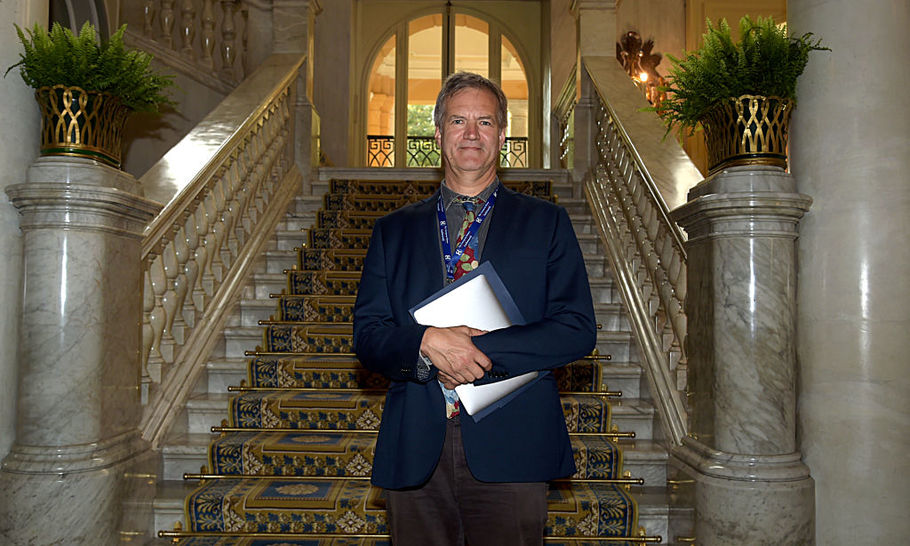What should the Brexit Party stand for? Community, identity and above all democracy

David Goodhart (Photo by Pier Marco Tacca/Getty Images)
People are complaining that the Brexit Party doesn’t have policies. At this stage, that lack is understandable — or you could say, only one policy matters, and that it has, loud and clear.
But now the Party is contesting the Peterborough by-election on June 6. And Nigel Farage has indicated that the Party will contest the next general election. Pushed on its policy vacuum during a recent LBC interview, he said something intriguing. He said the party will derive policy by “having votes amongst registered supporters”. He said “We are going to consult them and we will produce policy based on what our supporters think”.
At face value, it does seem like the Brexit Party will have a problem with policy because its supporters come from across the political spectrum. There are “right-wing” Brexiteers and “left-wing” Brexiteers; ex-Conservative and ex-Labour supporters. There are also many in the camp of “I’ve never bothered to support a party before because none of them represent me”. Finding a way for the common ground between these groups to emerge is smart. But surely it’s a pipe dream?
No. Though it won’t be easy, it doesn’t have to be a pipe dream. It is already possible to sketch out the kind of political position that might emerge. And it is also likely that Brexiteers will relish such a political process and then respect the results.
In terms of political positioning, there are a couple of social commentators who have done a lot of work on “what the British people think”. These are Matthew Goodwin and David Goodhart. In a two-minute statement, here, Matthew Goodwin summarises the results of much of his research on the views of the great British public.
Goodwin says “Most people are not looking for a reboot of Blair’s third way — or for a British Macron . . . Voters don’t want more social and economic liberalism”. This explains the dismal fortunes of Change UK.
He says “People like what Labour has to say on the economy, but they don’t trust Labour on faith, flag, and family”. Conversely, people like what the Conservatives have traditionally said on faith, flag, and family, but they don’t believe the party will “make the economy fairer and more equal”.
On the economy, Goodwin says: “Most people accept globalisation but fear it is fuelling inequality. Most people accept the need for free market competition but think that big business is taking them for a ride.” On immigration: “Most people are positive about immigration but want to slow the pace of immigration and don’t want to be called a racist for saying so.” On culture: “Most people are passionately proud to live in Britain . . . and they value community and identity.”
Goodwin ends by saying: “People want us to be tougher on crime, to lower immigration, to spend more on public services, to do more to regulate big business. That’s the space for a new party.”
What I would add from David Goodhart is an extra dollop of localism and community. In his book, The Road to Somewhere, Goodhart described a demographic group which he called “Somewheres”. He says they make up about 50 per cent of the population — and the bulk of Leave voters. He says Somewheres are people who are most likely to live in or near the place they were born and near to extended family. They believe in a thing called Society and are “communitarian” by nature. For many Somewheres, meaning in life comes from extended family and friends, home, town, and nation. Somewheres are likely to have as strong a sense of duty, as of rights. They respect tradition and want to have a sense of place and belonging. This ties in well with Goodwin on “faith, flag, and family” and on capitalism moderated by “fairness”.
Together these two commentators arrive at a strong “social conservative” vision. I think it reflects the type of policy platform that the Brexit Party might arrive at if it listens to its members.
But surely getting there is a pipe dream? I don’t think so. In my personal experience, the single thing that most unites Brexiteers is a love of democracy. We love our country and our democracy. But we also love democracy as a concept; the idea of self-rule by a defined group of people, living as moral equals. At a recent Brexit Rally, Claire Fox quoted Sylvia Pankhurst: “All the best of our life today has been fashioned by and through democracy.”
That love of democracy, in turn, relies on a love of free speech and vigorous debate, without which an understanding of who we are and how we want to live will not emerge. And that too, in turn, rests upon a bedrock of good manners and respect for each other and for each other’s views. Edmund Burke said: “Manners are of more importance than laws. Upon them, in a great measure, the laws depend.” We must tolerate the legitimacy of each others’ views, even if those views differ wildly from our own.
In my experience Brexiteers love democracy, and free speech, and debate. We want to feel part of this great country and our political processes. We will be good at the process that Farage has started to sketch out. Bring it on.




